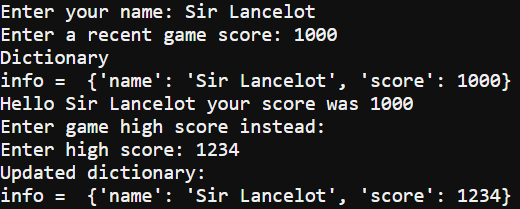Earlier, you used statements to add key-value pairs that were not already in the dictionary. If a dictionary already has a given key, those statments can be used to change the value that’s paired with the key.
- Change project's name from interactive_dictionary to interactive_dictionary_try_this.
- Add the statements below to the end of the script.
- Save the modified script.
- Click the Send to micro:bit button.
print("Enter game high score instead: ")
text = input("Enter high score: ")
value = int(text)
info['score'] = value
print("Updated dictionary: ")
print("info = ", info)
- In the serial monitor, click the the right of the Enter your name: prompt.
- To make it match the example shown here, enter the same values that you did before, and then enter 1234 when prompted to enter high score.
- Verify that the updated dictionary that gets displayed is info = {'name': 'Sir Lancelot', 'score' : 1234}.

Pay close attention to the difference between the first and second time the script executes this statement:
info['score'] = value
The first one in the script added the key-value pair 'score' : 1000 to the info dictionary. The second one changed that key value pair to 'score' : 1234.
Did You Know?
This kind of dictionary isn't alphabetical! The order that the key-value pairs are in doesn’t matter. You will always use a key to get the value paired with it.
For example, it doesn’t matter which one of these dictionaries you use, info['score'] still returns 1234.
info = {'name': 'Sir Lancelot', 'score' : 1234}
info = {'score' : 1234, 'name': 'Sir Lancelot'}
